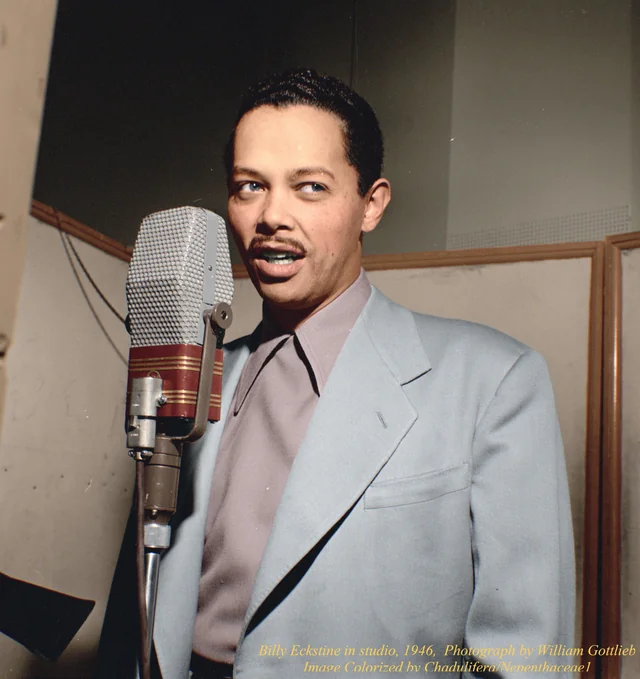Billy Eckstine (1914-1993) was an American jazz and pop singer, bandleader, and influential figure in the development of bebop, one of the most important jazz movements of the 20th century. Known for his rich, baritone voice and sophisticated style, Eckstine broke new ground as an African American artist in a genre that was predominantly led by white crooners. His work as a bandleader helped launch the careers of several key figures in jazz, making him a pivotal figure in the history of American music.
Overview of Billy Eckstine
- Early Life and Career Beginnings: Born William Clarence Eckstine on July 8, 1914, in Pittsburgh, Pennsylvania, Billy Eckstine began singing at a young age and was initially inspired by the crooning styles of Bing Crosby and Al Jolson. After winning an amateur singing contest, Eckstine moved to Chicago, where he began performing with various bands. His breakthrough came in 1939 when he joined Earl Hines’s orchestra as a vocalist. His smooth, yet powerful voice quickly made him a standout performer, and his hits with the Hines band, including “Stormy Monday Blues,” established him as a leading figure in jazz and popular music.
- Formation of the Billy Eckstine Orchestra: In 1944, Eckstine formed his own band, the Billy Eckstine Orchestra, which became one of the most important big bands of the bebop era. The band included some of the most innovative and influential musicians of the time, such as Dizzy Gillespie, Charlie Parker, Miles Davis, Art Blakey, and Sarah Vaughan. Under Eckstine’s leadership, the orchestra became a breeding ground for the development of bebop, a revolutionary style of jazz characterized by fast tempos, complex harmonies, and intricate improvisation.
- Vocal Career and Pop Success: Alongside his work as a bandleader, Eckstine developed a successful solo career as a vocalist. His deep baritone voice, combined with his ability to blend jazz and pop sensibilities, made him one of the first African American male singers to achieve mainstream success with both black and white audiences. Hits like “Cottage for Sale,” “My Foolish Heart,” and “I Apologize” became standards, and his sophisticated style earned him comparisons to other leading male vocalists of the era, such as Frank Sinatra and Nat King Cole.
- Challenges and Legacy: Despite his success, Eckstine faced significant challenges in his career, including racial prejudice and industry limitations that often restricted African American artists to specific genres and audiences. Nevertheless, he remained a popular and influential figure in both jazz and pop music throughout the 1940s and 1950s. His appeal waned somewhat in the 1960s as musical tastes shifted, but he continued to record and perform until the late 1980s, leaving behind a legacy as a pioneering artist who helped pave the way for future generations of black vocalists.
Impact on Music and Culture
- Pioneering Bebop Bandleader: Billy Eckstine’s orchestra was one of the first big bands to embrace and promote the bebop style, which would become one of the most influential movements in jazz history. By assembling a group of young, innovative musicians, Eckstine played a crucial role in the development and dissemination of bebop, which challenged and expanded the boundaries of jazz. The impact of his orchestra is still felt today, as many of the musicians who passed through it went on to become some of the most important figures in jazz.
- Breaking Racial Barriers in Popular Music: Eckstine was one of the first African American male singers to achieve widespread success in the mainstream pop market, appealing to both black and white audiences. His smooth baritone voice and romantic ballads helped him transcend racial barriers at a time when segregation was still prevalent in the United States. His success as a crossover artist opened doors for future black vocalists in the pop and jazz genres.
- Influence on Vocalists and Musicians: Eckstine’s rich voice and distinctive style influenced a generation of vocalists, including Johnny Mathis, Marvin Gaye, and Luther Vandross. His ability to interpret songs with emotional depth and sophistication set a standard for male vocalists in jazz and pop. Additionally, his role as a bandleader provided a platform for some of the most important musicians in jazz history, including Charlie Parker, Dizzy Gillespie, and Sarah Vaughan, helping to shape the sound of modern jazz.
- Enduring Legacy: Despite facing challenges related to race and the shifting musical landscape, Billy Eckstine’s contributions to jazz and popular music have endured. His recordings remain celebrated for their vocal excellence and musical innovation, and his influence continues to be recognized by both jazz enthusiasts and musicians. Eckstine’s ability to straddle the worlds of jazz and pop made him a unique and pioneering figure in American music.
YouTube Channel:
https://www.youtube.com/channel/UCBUD7HHJ2J-H4CY8jivDeMA
References
- Friedwald, Will. Jazz Singing: America’s Great Voices from Bessie Smith to Bebop and Beyond. Da Capo Press, 1990.
- Gourse, Leslie. Unforgettable: The Life and Mystique of Nat King Cole. St. Martin’s Press, 1991. (Includes context about Eckstine’s contemporaries)
- Ramsey, Guthrie P., Jr. Race Music: Black Cultures from Bebop to Hip-Hop. University of California Press, 2003.
- Gitler, Ira. The Masters of Bebop: A Listener’s Guide. Da Capo Press, 1985.
- Rockwell, John. “Billy Eckstine, 78, Singer And Bandleader of Bop Era.” The New York Times, 1993.


Leave a Reply